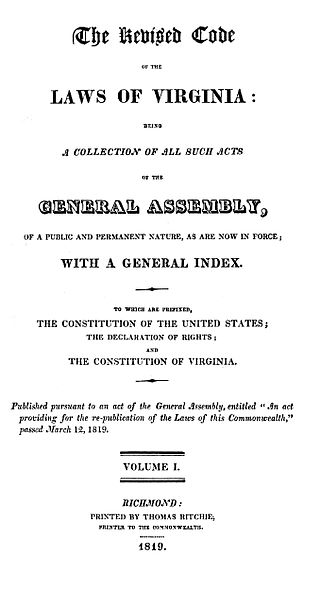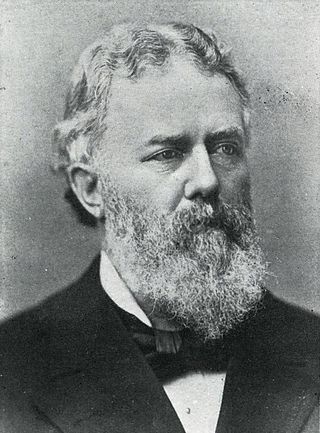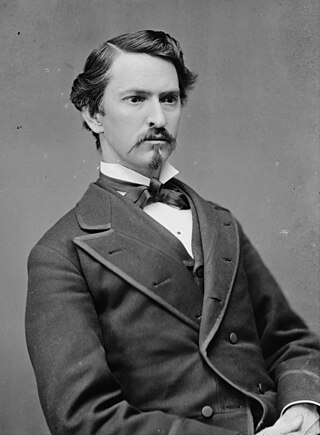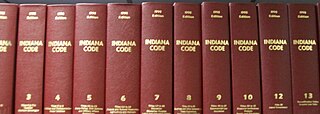
In the law of the United States, the Code of Laws of the United States of America is the official compilation and codification of the general and permanent federal statutes. It contains 53 titles. The main edition is published every six years by the Office of the Law Revision Counsel of the House of Representatives, and cumulative supplements are published annually. The official version of these laws appears in the United States Statutes at Large, a chronological, uncodified compilation.
In law, codification is the process of collecting and restating the law of a jurisdiction in certain areas, usually by subject, forming a legal code, i.e. a codex (book) of law.
The Massachusetts General Laws is a codification of many of the statutes of the Commonwealth of Massachusetts. The Commonwealth's laws are promulgated by an elected bicameral ("two-chamber") legislative body, the Massachusetts General Court. The resulting laws—both Session Laws and General Laws—together make up the statutory law of the Commonwealth.

The Code of Virginia is the statutory law of the U.S. state of Virginia, and consists of the codified legislation of the Virginia General Assembly. The 1950 Code of Virginia is the revision currently in force. The previous official versions were the Codes of 1819, 1849, 1887, and 1919, though other compilations had been printed privately as early as 1733, and other editions have been issued that were not designated full revisions of the code.

The Oregon Blue Book is the official directory and fact book for the U.S. state of Oregon prepared by the Oregon Secretary of State and published by the Office of the Secretary's Archives Division.

Matthew Paul Deady was a politician and jurist in the Oregon Territory and the state of Oregon of the United States. He served on the Oregon Supreme Court from 1853 to 1859, at which time he was appointed to the newly created federal court of the state. He served as a United States district judge of the United States District Court for the District of Oregon in Portland, as the sole Judge until his death in 1893. While on the court he presided over the trial that led to the United States Supreme Court decision of Pennoyer v. Neff concerning personal jurisdiction.
The Ohio Revised Code contains all current statutes of the Ohio General Assembly of a permanent and general nature, consolidated into provisions, titles, chapters and sections. However, the only official publication of the enactments of the General Assembly is the Laws of Ohio; the Ohio Revised Code is only a reference.
Oregon Administrative Rules Compilation (OAR) is the official compilation of rules and regulations, having the force of law in the U.S. state of Oregon. It is the regulatory and administrative corollary to Oregon Revised Statutes, and is published pursuant to ORS 183.360(3). It is compiled and issued annually by the Administrative Rules Unit of the Secretary of State's Archives Division, with monthly updates issued as the Oregon Bulletin, the latter also providing notice of intended rule action, Executive Orders of the Governor, Opinions of the Attorney General, and orders issued by the Director of the Department of Revenue.

The California Codes are 29 legal codes enacted by the California State Legislature, which together form the general statutory law of California. The official Codes are maintained by the California Office of Legislative Counsel for the Legislature. The Legislative Counsel also publishes the official text of the Codes publicly at leginfo.legislature.ca.gov.

Lafayette Lane was an American lawyer and politician who served one term as a US Representative from the U.S. state of Oregon from 1875 to 1877. He was the son of Oregon Senator Joseph Lane and an uncle of future Oregon Senator Harry Lane.
The Office of the Oregon Legislative Counsel is a government agency in the U.S. state of Oregon. The office was established in 1953, primarily to offer legal services to the members and committees of the Oregon Legislative Assembly.

The Indiana Code is the code of laws for the U.S. state of Indiana. The contents are the codification of all the laws currently in effect within Indiana. With roots going all the way back to the Northwest Ordinance of 1787, the laws of Indiana have been revised many times. The current approach to updating Indiana Code began in 1971 when the Indiana Statute Revision Commission began a complete rearrangement. The first official edition of the Indiana Code was published in 1976, and is regularly updated through the Office of Code Revision in the Legislative Services Agency.
The law of Texas is derived from the Constitution of Texas and consists of several levels, including constitutional, statutory, and regulatory law, as well as case law and local laws and regulations.
The law of Illinois consists of several levels, including constitutional, statutory, and regulatory law, as well as case law and local law. The Illinois Compiled Statutes (ILCS) form the general statutory law.
The law of the U.S. state of Georgia consists of several levels, including constitutional, statutory, and regulatory law, as well as case law and local law. The Official Code of Georgia Annotated forms the general statutory law.
The law of Michigan consists of several levels, including constitutional, statutory, regulatory and case law. The Michigan Compiled Laws form the general statutory law.
The law of Washington consists of several levels, including constitutional, statutory, regulatory and case law, as well as local ordinances. The Revised Code of Washington forms the general statutory law.
The Illinois Compiled Statutes (ILCS) are the codified statutes of a general and permanent nature of Illinois. The compilation organizes the general Acts of Illinois into 67 chapters arranged within 9 major topic areas. The ILCS took effect in 1993, replacing the previous numbering scheme generally known as the Illinois Revised Statutes, the latest of which had been adopted in 1874 but appended by private publishers since.

The Colorado Revised Statutes (C.R.S.) are a legal code of Colorado, the codified general and permanent statutes of the Colorado General Assembly.
The Code of the District of Columbia is the codification of the general and permanent laws relating to the District of Columbia. It was enacted and is revised by authority of the Congress of the United States.








